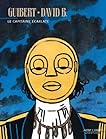Maybe it's me hitting middle age and leaning towards a more conservative nature but the excellent film The King's Speech made me think about two things: One, the advent of psychoanalysis as a science albeit in an eccentric and unorthodox manner; Two, a justification for my recent contemplations on the importance of royalty in governing bodies of nation-states. Now I am not in favor of nation-states to say the least. In fact, I would call myself an anarchist if any political tendency is required to be submitted, however given the hideous shape representative democracy has taken today and which, until the foreseeable future at least, seems to be here to say, I have begun to consider the virtues of having a royal family at the head of a government, even if it shall function -or precisely as- a symbolic construct. There are two reasons for this: The first is the short cut to the Aristotelian notion of catharsis in Greek Tragedy translated onto the political stage. Very briefly, the commoner sees the way in which their superiors are wrapped up in the same human anguishes, if not more, and live pretty much the same anxious existence that they do, albeit on a financially more elevated scale, which makes the scandals and shortcomings even more delicious to the senses most of the time. David's resignation of the throne due to his love for a twice-divorced American woman (from Baltimore to top it off) in the film instigates more disgust in the royal family than in the people. For the commoner, it only goes to show that royalty is not devoid of human mistakes, errors and emotional fervor, which if i might add, can only restore any dignity in their eyes that was previously lost from the point of view of the royal family.
Now the second reason relies on, in my opinion, the present failure of representational democracy around the world. I do not take pleasure in being ruled by a bunch of oafs in suits who were in turn elected, by god knows what motivation, by other oafs who are mostly unable to think for themselves. Yes I know, this sounds very elitist and in contradiction to my anarchistic tendencies, however, anarchism depends heavily on an ethos of equality that also includes a certain level of awareness of the position and function of oneself in the world in relation to others, which doesn't manifest itself just by pertaining to the human race. Anyway, that is for another post. Coming back, it seems to be that masses of people who look towards leaders also look for reference points that collate and unite certain values and tradition that serves to hold them together and the above-mentioned oafs are far from offering this. Besides, the motivation of leading through representation is always bundled up with extremely pragmatic reasons for entering politics. On the other hand, royalty in a certain sense is bound by tradition and cannot go against the values it purports to represent as historical continuity. One must separate royalty and aristocracy here though. Decadence in the latter is far more possible than in the former. Again I do not think values and traditions are necessary for the governance of the human race but today it seems like the majority does indeed feel this need. Royalty may indeed be able to perform this function even if it may be completely and solely symbolic. I do not offer a better solution but only as a social safety valve for -the many- occasions when parliamentary politicians just become too disgusting to bare. I'm all up for the constant re-formulation of values and am completely open to change, and royalty at least offers a point of departure, even if the results contradicts the points of origin. It is easier to work within limits than be completely free to choose whatever one wants. Most of the time, with unlimited choice comes unlimited stupidity.
Must continue some other time, this post has already become too long... And the point about psychoanalysis is, i think, too apparent in the film to go into depth.
 Late Lyrics and Earlier by Thomas Hardy
Late Lyrics and Earlier by Thomas Hardy








